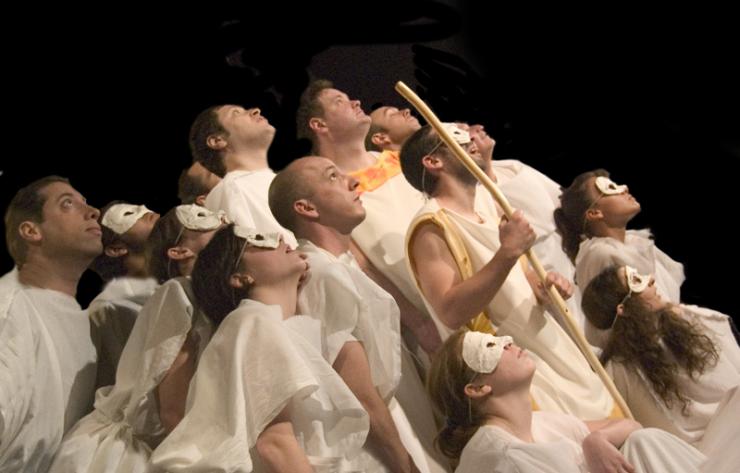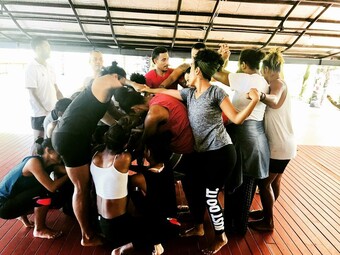Scripts For Free
Recently, I created two new websites, one for each of my two translations/adaptations of Greek plays, Lysistrata and Iphigenia in Aulis. I put the full text of both plays on each website, and some supporting materials—essays, info about the original productions, etc. And now I am waiting.
What am I waiting for? In essence, the results of an experiment, or rather a permutation of an experiment that pretty much co-evolved with the Internet. Still, I have no idea what the result of my version of this experiment will be.
I do like the idea of providing well-written (I hope) modern translations for free to those studying or simply interested in the plays. But my main goal is to inspire productions.
The broader experiment, of course, is what happens when you provide intellectual property online for free. In this particular case, what result am I hoping for? I do like the idea of providing well-written (I hope) modern translations for free to those studying or simply interested in the plays. But my main goal is to inspire productions. In essence, I am saying the artistic satisfaction of having one’s work read and produced is much greater than having it lay hidden. And, just as importantly, the intellectual property of an unread script has much less economic potential than that of possible future productions—I should mention, in this context, that I will continue to charge royalties to those who choose to stage the scripts.
In the more altruistic vein, the additional material on each site provides no real personal value, except perhaps to drive a little more traffic. Mainly it is there for those interested either for academic reasons or as support to those producing the play. Also, readings can be conducted free of royalties, and those who wish to use pieces of the work as part of a theatrical collage are free to do so, as long as I am credited.
I allow collages as an acknowledgment of how modern work is often created, combining two or more disparate elements, such as text and image, into a new artwork. As an independent theatre maker in New York, I have enjoyed watching and occasionally creating this style of work, and indeed the idea of putting plays on the net for free comes partly from that tradition.
The first playwright I am aware of to conduct a similar experiment with the text of his plays is Chuck Mee, who put his plays online almost twenty years ago. All his texts are on his website, the (re)making project, and he invites writers to use the work at will in creating their own theatrical collages. However, if they use his work more or less as written, he requests royalties.
Richard Foreman did something similar on his website. He threw open his notebooks, the raw material from which he creates he plays, and invited the public to create their own plays from it. He asks no royalties, but he does request that if the material is used for a performanace that he be notified and credited.
I find the connection to Foreman’s work particularly relevant. I have directed Foreman’s texts on multiple occasions, and one of the most fascinating aspects of that process is the fact that Foreman writes just lines of dialogue, not characters. When I directed, I was the one who distributed and allotted the lines among the actors. Similarly, in ancient Greek texts, there are no characters, and part of the process of translation is assigning lines to characters. Sometimes those decisions are a bit obvious, but other times it is hard to judge original intent. And with my modern sensibilities/ tendencies to find a character arc, I have used that ambivalence to my advantage when adapting.
To that end, I have also provided the raw text from Lysistrata on the site, so that potential directors who wish to can make that decision for themselves.
Of course, when it comes to classics on the Internet, few sites compare to the Gutenberg Project, where you can find virtually anything in public domain. Both Lysistrata and Iphigenia in Aulis exist there, in old translations, though I find those translations both dated and stilted. I have, however, relied extensively on the Gutenberg Project for my own research. And yes, I did look at those translations when I was working on mine to compare interpretations.
Another valuable research tool is Perseus. Not only does it include many of the same translations that can be found on the Guttenberg Project, it also has the original ancient Greek versions of the plays with hypertext translations linked to single words, so that if you want to parse through a sentence word by word, all you need is the patience to click back and forth. I used the site frequently during my work adapting both plays.
There is even an impressive website called Bacchicstage, created by an Australian named George Theodoridis, which has a relatively comprehensive collection of translations of the major Greek plays, all by Mr. Theodoridis. I wrote to him and he told me that a number of the translations have received productions and that many schools now use it as a reference.
And there are a few other translations I have come across via google, mostly public domain work, appearing on university websites and other such research oriented sites.
My translations are written specifically for performance. Yes, my texts try to be true to the meaning and spirit of the original, but I always chose dramatic clarity and power over complete faithfulness to the original text. Many translations, especially those available online, are written by academics, scholars of ancient Greek. I am not a scholar, much as I would love to have that knowledge. But I am a playwright.
I call my translations adaptations because I can’t claim the knowledge of a scholar. I consulted old translations, essays, etc., to make sure that what I wrote abided by the spirit, if not always the letter, of the thoughts being expressed, working sentence by sentence. But I strongly believe that there is a difference between translations written as a record of the literal meaning of the original and translations meant to come alive on stage. Which is why it is so important to me to have these online texts lead to productions.
Both of my translations were originally produced by my theatre company, Untitled Theater Company #61. Lysistrata was also published, via Theater 61 Press, the small press branch of the theatre company. That book, to my surprise, inspired about twenty different university productions, not only in the United States but in England, Ireland, and even Germany and Vietnam (with English-language theatre groups/departments).

Book sales continue in some theatre departments, and though the online version may cut down somewhat on sales, I hope the tradeoff is more than worth it. The book is now ten years old, and in that time the way people find plays has shifted even more online. The website seems like a much more effective way to reach people.
I have been focusing on ancient Greek drama, but of course all of this is applicable to contemporary scripts. There are sites popping up that collect scripts from multiple authors virtually for free. One is the New Play Exchange (part of the National Play Network), where any member can read uploaded plays by participating playwrights. Another is Indie Theater Now, a curated collection of plays from New York’s independent theatre scene. Here there is a charge per script, but the charge, just a little more than a dollar per play, is nominal. I participate in both programs.
More broadly speaking, as I alluded to at the beginning of this article, this experiment is part of an ongoing conversation about the evolution of copyright in the Internet age. I am a fan of Creative Commons, a nonprofit organization that offers a variety of copyright licensing to make it easier for artists to share their work and collaborate. HowlRound content is available under Creative Commons licenses, so this very article is part of that conversation. I do not use a Creative Commons license with most of my work yet, though eventually I intend to transition some or all of it.
One of the main questions that the modern age has brought to copyright is whether the proliferation of music and words and images that can now be accessed for free, have devalued the worth of the original creation, or whether it has presented an opportunity for that creator to reach people who would never otherwise experience the work.
As has been extensively discussed on HowlRound, one of the main questions that the modern age has brought to copyright is whether the proliferation of music and words and images that can now be accessed for free, legally and illegally, have devalued the worth of the original creation, or whether it has instead presented an opportunity for that creator to reach people who would never otherwise experience the work. Certainly, the assumption that we as writers might wish to work for free, that in fact our writing has no innate value, is not an uncommon one.
For example, a few years ago a google alert let me know that someone was producing my adaptation of Lysistrata at a Midwest university. They had a web page with all the details. I wrote to them to say that I was glad to hear about their production, and could we talk about royalties.
I was emailed that they felt that since the university was a nonprofit, they did not think that they owed royalties. I explained that was not the case. I never heard back from them again. I don’t know if the production went forward, but I suspect so.
And yet…there is also clearly another side to the coin, ways in which we can use the Internet to ultimately create value. I also write children’s books, and I know that some have sold precisely because the publisher provided a free sample on the internet: a first chapter, or for my picture books, the first few pages. With books, the written work is the end product, so one can only offer that glimpse as an enticement. With scripts, the written word is not only an end in itself but also the blueprint of a production, an enticement towards the next step.
So, that’s the experiment. Will my new websites just encourage more covert productions and the expectation of no royalties? Or is there a balance between finding a new, freer way of sharing work and still getting paid as an artist? So now, the waiting. As Euripides once explained, and I here slightly adapt, all questions will be answered if you have the patience to allow time to speak.
















Comments
The article is just the start of the conversation—we want to know what you think about this subject, too! HowlRound is a space for knowledge-sharing, and we welcome spirited, thoughtful, and on-topic dialogue. Find our full comments policy here
Damn, you're good. Your approach is certainly scholarly, whether you have the credentials of a scholar or not. I'm impressed with this. Wish I had more time to immerse myself in it. I shall at least go tweet about it.
Thanks so much, and for the tweet. Glad to hear it feels scholarly, I have scholarly predisposition, in another life would be quite drawn to academia.
Academia, alas, is not what it once was, as you probably noted in the case of the university that thought their nonprofit status permitted theft of IP. Any university worthy of the name would be well aware that such is not the case. This and other forms of ethical bankruptcy are widespread in academia. But that's a side issue. I once aspired to teach, and I've actually done so briefly. At this stage, I have to be content with cranking out an occasional play, a novel or two, and maybe, someday, a screenplay.
A very interesting piece.
At UCLA, we run a project to promote productions of Hispanic classical theater. We have been translating previously untranslated plays specifically for performance, and posting the complete translations, with introductions and annotations, on our site: http://diversifyingtheclass...
Our goals are somewhat different, in that we don't seek royalties, but I would be interested in your sense of what helps to make online scripts visible. The plays have fabulous roles for women, and offer sophisticated reflections on what it means to exist in an urban world of fashion and wit.
That's a great website. I'm still figuring our how to make the scripts visible, but having the advantage of being part of a university seems like it would be a big help. Have you been contacting other universities to let them know?
It's easy for us to reach other scholars--that's our community. The challenge is to get word of the initiative out to the broader theater community--any suggestions much appreciated!
It's a good question. I've been trying with my websites, but it's hard to say how successful I've been yet. Would be happy to cross promote, if that would help.
I think Euripides' The Bacchae is the most interesting of the Greek plays since it demonstrates how universal shamanism is as an archetypal expression of spirituality. I'm surprised it isn't a more popular play since many theater artists have studied Depth Psychology and Jungian psychologists have written a lot about shamanism. Shamans have even been considered primitive actors performing rituals to heal their tribe through the same psychological processes as modern theater. The Greeks and the Irrational by E. R. Dodds is the best book on the Greeks possible encounters with shamans.
It's a fascinating play, though I've not yet seen a convincing production (I've seen three, which is only a small sample of course). Would love to see it fully realized.
Mine are in gustavoott.com.ar, both in English and Spanish (and several other languages). "Scripts for free" really works for me, specially promoting productions around the world. Great article, Edward,. regards. Gustavo Ott
Thanks Gustavo, good to hear that it works for you.
I have put my play scripts -- and monologues -- on my Stagepage.info web site for many years. I do not charge most students and teachers for the use of them-- although the Canadians have a policy and a budget to pay author-publishers if students find original work they want to do on the web. Back when I was one of a very few authors who web-published complete scripts, I had 100s of school and college productions a year. Most begged to be excused from paying royalty b/c "there's no budget for royalties: we're supposed to do a script that's in the Public Domain, but I'd so much rather do yours...." Some simply assume that they are exempt from copyright and that theft is the sincerest form of flattery.
Now there are many "forensic" anthologies and theatrical web sites offering free or cheap downloads, and if they have links to large commercial sites Google favours them in search results.
For technical reasons I was unable to add new pieces for 3 years, and my production numbers have dropped precipitously. Now my site is being upgraded to work with mobile devices, which I hope will push those numbers up again.
I recently added about a dozen scripts, new and old, long and short, to the New Play Exchange. Nothing has come of this yet..... but perhaps in time? At the moment my most "poplar" short comedy is one that was written 30 years ago, when I first noticed that all the prosperity from increases in productivity was going to the financial sector and Upper Management-- it took 20 years for that script to have a premiere production-- outside the US-- but this year it's had several.
Interesting, and thanks for sharing.
Thanks Edward for this informative article and the resources, Especially Creative Commons, I will check that out. I'd like to have more articles on this issue and comments, specifically playwrights who are utilizing New Play Exchange and their experiences with it. I've been thinking of utilizing it and am a bit paranoid about material being used without honoring any royalty agreement. The issue with the University not arranging payment of royalties was despicable. When will theatre, movies, and television get the reality of 'with no script they have no product to mount.' I'm also getting tired of many [most?] theatres having new play festivals, that will have minimal production values, charge admission, and pay the playwright nothing [as the payment is in having the honor of them presenting your play]. And while that is indeed an honor, they often have the requirement that the play not have been produced elsewhere. When investigating this requirement with one particular theatre they informed me that it was because they got funding to present the festival and the requirement for the funding was that the plays not have been produced previously. If that is often the case, then ask for more funding so the playwrights can receive some financial 'token' compensation, as it's difficult to get a second production elsewhere, even if it's 800 miles away in another state. I don't know of any playwrights that write plays to be produced once. Hope the conversation continues.
Thanks, glad it's useful. My experience with the NPX is that it hasn't led anywhere so far, but it's early yet in that experiment. I agree with you that the not previously produced provision is pretty insane, sometimes. I'm picky as a result in terms of first productions, but it's frustrating. We need a paradigm shift there, but it is partly a problem with funding.
What a resource-full and insightful article; I'm glad I read it. I did know of some of these resources, but the new ones are very helpful. I always forget that adaptations and translations are a possibility,and I definitely think this is a realm which I would love to explore.
And I wonder- just as retailers know that a percentage of their losses are going to go to theft, if we enter with that same mindset and not let it break us - if that would uplift the positive benefits of making our art accessible to others. Thought-provoking discussions you present here. Thank you.
Thanks so much Kara, I'm glad you enjoyed the article.